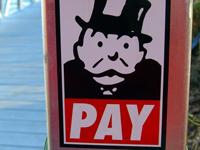BOB GARFIELD: Remember back [LAUGHS] in the old days when Americans hated banks and Wall Street and wanted financial executives stripped of their salaries and gold bathroom faucets? That was before CFPA which, according to the Chamber of Commerce, is much, much worse.
[CLIP/MUSIC UP AND UNDER]:
FEMALE ANNOUNCER: Americans are losing sleep over this economy, especially small business owners, worrying about payroll and mounting bills. Now Washington wants to make it worse with the CFPA, a massive new federal agency that will create more layers of regulation and bureaucracy. The CFPA -
[END CLIP]
BOB GARFIELD: The CFPA is the Consumer Financial Protection Agency, which the Obama Administration wants as part of financial reform legislation but which business groups and congressional Republicans are portraying as yet another intrusion by big government into our lives. Want to learn more? Visit Stopthecfpa.com.
BILL BUZENBERG: This is kind of an echo that we've heard of in the health care debate, you know, how bad government is.
BOB GARFIELD: Bill Buzenberg is executive director of the Center for Public Integrity, a nonprofit that investigates the impact of lobbying money on official Washington. He says that the financial sector has poured more cash into congressional campaign coffers than pharma, telecom or even energy.
BILL BUZENBERG: Since ’89, $2.3 billion, almost 20 percent of all contributions to candidates and PACS and committees have come from the financial industry.
BOB GARFIELD: Which means, he says, that lobbyists have already purchased the attention of the senators who may this summer be voting on reform, and surely will be financing more advertising designed to deflect attention from greedy and ruinous speculation to a non-existent bailout.
[MUSIC UP AND UNDER] This from a GOP group calling itself the Committee for Truth in Politics: Amid ominous music, the text warns about the four-trillion-dollar big bank bailout. Somehow it neglects to mention that the fund would be paid for not by Joe Taxpayer but by the financial industry itself.
EVAN TRACEY: Is it, you know, 100 percent accurate? No political advertising’s ever 100 percent accurate. [LAUGHS]
BOB GARFIELD: Evan Tracey is president of the Campaign Media Analysis Group.
EVAN TRACEY: What it is is in all forms of advertising, but especially in political, it’s, it’s really about your version of the truth. You’re going to try and couch this legislation in the way that it’s going to help you the most politically.
BOB GARFIELD: Big finance’s determination to shift perceptions, he says, is not limited to policy ads. Tracey points to ads by large banks, which have increasingly stopped talking about free checking and begun emphasizing, perhaps more nostalgically than accurately at the current moment, how they make the loans that keep our economy running.
EVAN TRACEY: It’s very much like the energy debate where all of a sudden you don't hear Exxon talking about putting a tiger in your tank anymore as much as you talk about them being a different kind of energy company.
BOB GARFIELD: British Petroleum turns its logo into a green leaf, and GMAC, the finance arm of General Motors that was beneficiary of billions in TARP money, rechristens itself as Ally Bank. It is difficult, after all, to explain what’s not so bad about the status quo but it’s really easy to change the subject.
